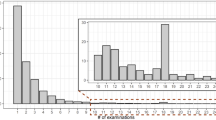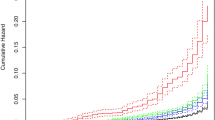Abstract
Limited research exists on identifying risk factors for preeclampsia (PE) in the chronic kidney disease (CKD) population, especially across different patient sources. This study aimed to address this gap by analyzing clinical data from CKD pregnant women admitted to Peking University Third Hospital from January 2012 to December 2022. Logistic regression analysis identified independent risk factors for PE in the CKD population and assessed variations among patients from different sources. Additionally, a predictive model for PE was established using data from the registered group. The study included 524 CKD patients. Hypertension, proteinuria, fibrinogen >4 g/L, serum albumin ≤30 g/L, and uric acid >260 μmol/L were independent risk factors for PE in the overall CKD population. Subgroup analysis revealed that hypertension, serum albumin ≤30 g/L, and uric acid >260 μmol/L were independent risk factors in the referred group, while hypertension, uric acid >260 μmol/L, and fibrinogen >4 g/L were independent risk factors in the registered group. The prediction model based on registered group risk factors showed good predictive efficiency, with the area under the curve of 0.774 in the training set and 0.714 in the validation set. In conclusion, this study revealed that hypertension and elevated uric acid are independent risk factors for PE in CKD patients regardless of patient source, while serum albumin and fibrinogen levels are associated with PE risk in specific patient subgroups. Our predictive model enables clinicians to quickly identify the risk of PE in CKD patients, and early intervention treatment to improve pregnancy outcomes.

This is a preview of subscription content, access via your institution
Access options
Subscribe to this journal
Receive 12 print issues and online access
$259.00 per year
only $21.58 per issue
Buy this article
- Purchase on Springer Link
- Instant access to full article PDF
Prices may be subject to local taxes which are calculated during checkout




Similar content being viewed by others
References
Hill NR, Fatoba ST, Oke JL, Hirst JA, O’Callaghan CA, Lasserson DS, et al. Global prevalence of chronic kidney disease—a systematic review and meta-analysis. PLoS ONE. 2016;11:e0158765.
Zhang JJ, Ma XX, Hao L, Liu LJ, Lv JC, Zhang H. A systematic review and meta-analysis of outcomes of pregnancy in CKD and CKD outcomes in pregnancy. Clin J Am Soc Nephrol. 2015;10:1964–78.
Hui D, Hladunewich MA. Chronic kidney disease and pregnancy. Obstet Gynecol. 2019;133:1182–94.
Esposito P, Garibotto G, Picciotto D, Costigliolo F, Viazzi F, Conti NE. Nutritional challenges in pregnant women with renal diseases: relevance to fetal outcomes. Nutrients. 2020;12:873.
Liyanage T, Toyama T, Hockham C, Ninomiya T, Perkovic V, Woodward M, et al. Prevalence of chronic kidney disease in Asia: a systematic review and analysis. BMJ Glob Health. 2022;7:e007525.
Al Khalaf SY, O’Reilly ÉJ, McCarthy FP, Kublickas M, Kublickiene K, Khashan AS. Pregnancy outcomes in women with chronic kidney disease and chronic hypertension: a National Cohort Study. Am J Obstet Gynecol. 2021;225:298.e1–e20.
Al Khalaf S, Bodunde E, Maher GM, O’Reilly ÉJ, McCarthy FP, O’Shaughnessy MM, et al. Chronic kidney disease and adverse pregnancy outcomes: a systematic review and meta-analysis. Am J Obstet Gynecol. 2022;226:656–70.
Nevis IF, Reitsma A, Dominic A, McDonald S, Thabane L, Akl EA, et al. Pregnancy outcomes in women with chronic kidney disease: a systematic review. Clin J Am Soc Nephrol. 2011;6:2587–98.
Madazlı R, Kaymak D, Alpay V, Mahmudova A, Seyahi N. Evaluation of obstetric outcomes and prognostic factors in pregnancies with chronic kidney disease. Hypertens Pregnancy. 2021;40:75–80.
Piccoli GB, Cabiddu G, Attini R, Vigotti FN, Maxia S, Lepori N, et al. Risk of adverse pregnancy outcomes in women with CKD. J Am Soc Nephrol. 2015;26:2011–22.
He Y, Liu J, Cai Q, Lv J, Yu F, Chen Q, et al. The pregnancy outcomes in patients with stage 3-4 chronic kidney disease and the effects of pregnancy in the long-term kidney function. J Nephrol. 2018;31:953–60.
Kumakura S, Okamoto K, Takeuchi S, Yoshida M, Nakamichi T, Nagasawa T, et al. Kidney function, blood pressure and proteinuria were associated with pregnancy outcomes of pregnant women with chronic kidney disease: a single-center, retrospective study in the Asian population. Clin Exp Nephrol. 2020;24:547–56.
Francisco C, Gamito M, Reddy M, Rolnik DL. Screening for preeclampsia in twin pregnancies. Best Pract Res Clin Obstet Gynaecol. 2022;84:55–65.
Stevens PE, Levin A, Global KDI. Evaluation and management of chronic kidney disease: synopsis of the kidney disease: improving global outcomes 2012 clinical practice guideline. Ann Intern Med. 2013;158:825.
ACOG Practice Bulletin No. 202: gestational hypertension and preeclampsia. Obstet Gynecol. 2019;133:1.
National Institute for Health and Care Excellence. Guidelines. In: Hypertension in pregnancy: diagnosis and management. London: National Institute for Health and Care Excellence (NICE); 2019.
American College of Obstetricians and Gynecologists’ Committee on Practice Bulletins—Obstetrics. ACOG practice bulletin no. 203: chronic hypertension in pregnancy. Obstet Gynecol. 2019;133:e26–e50.
Wiles K, Chappell LC, Lightstone L, Bramham K. Updates in diagnosis and management of preeclampsia in women with CKD. Clin J Am Soc Nephrol. 2020;15:1371–80.
Ives CW, Sinkey R, Rajapreyar I, Tita ATN, Oparil S. Preeclampsia-pathophysiology and clinical presentations: JACC state-of-the-art review. J Am Coll Cardiol. 2020;76:1690–702.
Sui Z, Wang J, Cabrera C, Wei J, Wang M, Zuo L. Aetiology of chronic kidney disease and risk factors for disease progression in Chinese subjects: a single-centre retrospective study in Beijing. Nephrology. 2020;25:714–22.
Kattah A. Preeclampsia and kidney disease: deciphering cause and effect. Curr Hypertens Rep. 2020;22:91.
Wiles K, Webster P, Seed PT, Bennett-Richards K, Bramham K, Brunskill N, et al. The impact of chronic kidney disease stages 3-5 on pregnancy outcomes. Nephrol Dial Transplant. 2021;36:2008–17.
Chaemsaithong P, Sahota DS, Poon LC. First trimester preeclampsia screening and prediction. Am J Obstet Gynecol. 2022;226:S1071–S97.e2.
Scott G, Gillon TE, Pels A, von Dadelszen P, Magee LA. Guidelines-similarities and dissimilarities: a systematic review of international clinical practice guidelines for pregnancy hypertension. Am J Obstet Gynecol. 2022;226:S1222–s36.
Petersen JF, Friis-Hansen LJ, Jensen AK, Andersen AN, Løkkegaard ECL. Early pregnancy reference intervals; 29 serum analytes from 4 to 12 weeks’ gestation in naturally conceived and uncomplicated pregnancies resulting in live births. Clin Chem Lab Med. 2019;57:1956–67.
Di Muzio E, Polticelli F, Trezza V, Fanali G, Fasano M, Ascenzi P. Imatinib binding to human serum albumin modulates heme association and reactivity. Arch Biochem Biophys. 2014;560:100–12.
Saitou T, Watanabe K, Kinoshita H, Iwasaki A, Owaki Y, Matsushita H, et al. Hypoalbuminemia is related to endothelial dysfunction resulting from oxidative stress in parturients with preeclampsia. Nagoya J Med Sci. 2021;83:741–8.
Kinoshita H, Watanabe K, Azma T, Feng GG, Akahori T, Hayashi H, et al. Human serum albumin and oxidative stress in preeclamptic women and the mechanism of albumin for stress reduction. Heliyon. 2017;3:e00369.
Seong WJ, Chong GO, Hong DG, Lee TH, Lee YS, Cho YL, et al. Clinical significance of serum albumin level in pregnancy-related hypertension. J Obstet Gynaecol Res. 2010;36:1165–73.
Gojnic M, Petkovic S, Papic M, Mostic T, Jeremic K, Vilendecic Z, et al. Plasma albumin level as an indicator of severity of preeclampsia. Clin Exp Obstet Gynecol. 2004;31:209–10.
Takahashi H, Hisano M, Sago H, Murashima A, Yamaguchi K. Hypoproteinemia in the second trimester among patients with preeclampsia prior to the onset of clinical symptoms. Hypertens Pregnancy. 2014;33:55–60.
Yue C, Ying C, Li X. Association of first trimester serum uric acid with preeclampsia: an observational cohort study with propensity score matching. Hypertens Res. 2023;46:377–85.
Khaliq OP, Konoshita T, Moodley J, Naicker T. The role of uric acid in preeclampsia: is uric acid a causative factor or a sign of preeclampsia? Curr Hypertens Rep. 2018;20:80.
Bainbridge SA, Roberts JM. Uric acid as a pathogenic factor in preeclampsia. Placenta. 2008;29:S67–72.
Martin AC, Brown MA. Could uric acid have a pathogenic role in pre-eclampsia? Nat Rev Nephrol. 2010;6:744–8.
Nakagawa T, Kang DH, Johnson RJ. An elevation in serum uric acid precedes the development of preeclampsia. Hypertens Res. 2023;46:809–11.
Beernink RHJ, Zwertbroek EF, Schuitemaker JHN, Cremers T, Scherjon SA. First trimester serum biomarker discovery study for early onset, preterm onset and preeclampsia at term. Placenta. 2022;128:39–48.
Manten GT, Sikkema JM, Franx A, Hameeteman TM, Visser GH, de Groot PG, et al. Increased high molecular weight fibrinogen in pre-eclampsia. Thromb Res. 2003;111:143–7.
Chen Y, Lin L. Potential value of coagulation parameters for suggesting preeclampsia during the third trimester of pregnancy. Am J Med Sci. 2017;354:39–43.
Han L, Liu X, Li H, Zou J, Yang Z, Han J, et al. Blood coagulation parameters and platelet indices: changes in normal and preeclamptic pregnancies and predictive values for preeclampsia. PLoS ONE. 2014;9:e114488.
Funding
This work was supported by the National Key Research and Development Program of China (2022YFC2703504).
Author information
Authors and Affiliations
Corresponding author
Ethics declarations
Conflict of interest
The authors declare no competing interests.
Additional information
Publisher’s note Springer Nature remains neutral with regard to jurisdictional claims in published maps and institutional affiliations.
Rights and permissions
Springer Nature or its licensor (e.g. a society or other partner) holds exclusive rights to this article under a publishing agreement with the author(s) or other rightsholder(s); author self-archiving of the accepted manuscript version of this article is solely governed by the terms of such publishing agreement and applicable law.
About this article
Cite this article
Ma, Y., Ma, M., Ye, S. et al. Risk factors for preeclampsia in patients with chronic kidney disease primarily focused on stage 1 CKD. Are referred and registered patients alike?. Hypertens Res (2024). https://doi.org/10.1038/s41440-024-01698-4
Received:
Revised:
Accepted:
Published:
DOI: https://doi.org/10.1038/s41440-024-01698-4



